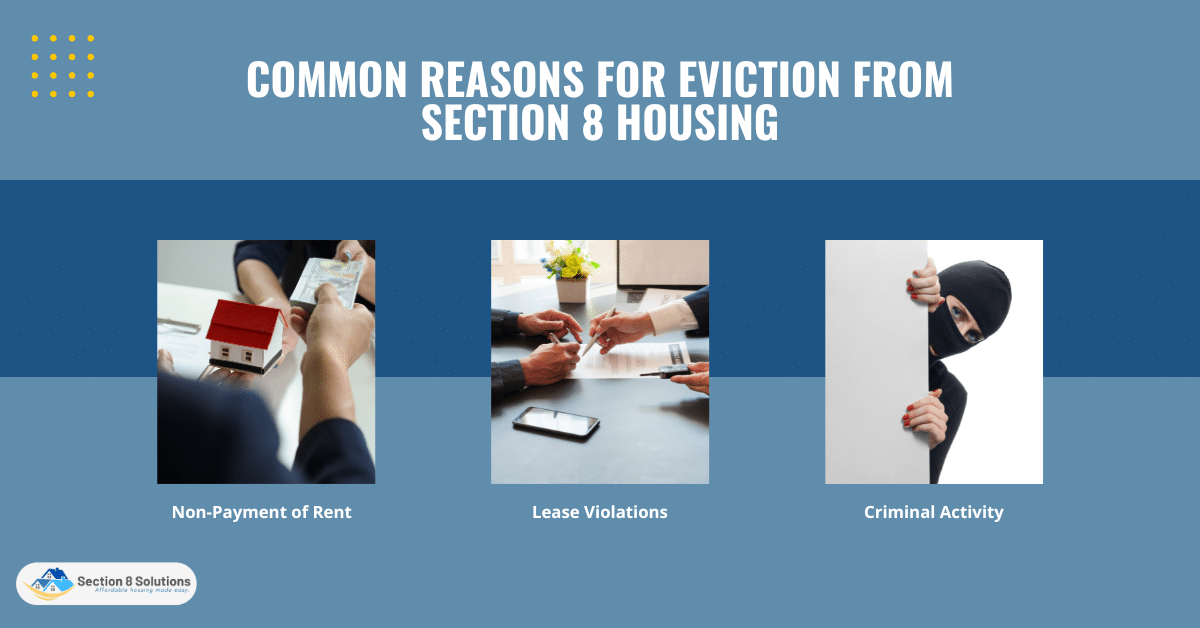Eviction from Section 8 Housing in Missouri can be a daunting experience for low-income residents. Non-payment of rent, lease violations, or criminal activity are common reasons for eviction. It is essential for tenants to understand their rights, seek legal assistance if faced with eviction, and explore available resources to prevent homelessness.
The aim of this comprehensive content brief is to provide an informative guide on eviction from Section 8 housing in Missouri. We will delve into the various aspects of eviction, including the common reasons, tenant rights, legal process, and preventative measures.

Section 8 Housing in Missouri
Section 8 Housing in Missouri is a critical program that offers invaluable assistance to low-income families and individuals in their pursuit of safe, stable, and affordable housing. Administered by the U.S. Department of Housing and Urban Development (HUD) and implemented at the state level by the Missouri Housing Development Commission (MHDC), the program is designed to address the housing needs of vulnerable populations and foster more inclusive communities.
To qualify for Section 8 housing assistance, applicants must meet specific eligibility criteria, including household income limits, citizenship or eligible immigrant status, and compliance with good conduct requirements. Priority is often given to families with children, elderly individuals, and those with disabilities, ensuring that those most in need receive essential support.
The benefits offered by Section 8 vouchers are significant. By subsidizing a portion of their rent, the program ensures that participants pay only a reasonable percentage of their income toward housing costs. This financial relief allows low-income households to access better housing options and free up resources for other crucial necessities, such as healthcare, education, and nutritious food.

Common Reasons for Eviction from Section 8 Housing
Eviction from Section 8 Housing can be a daunting prospect for low-income tenants, jeopardizing their stability and access to affordable housing. Understanding the most prevalent reasons for eviction is crucial for tenants to avoid potential pitfalls and maintain their housing security. In this section, we will explore the common reasons for eviction from Section 8 housing, including non-payment of rent, lease violations, and criminal activity, with real-life examples illustrating the consequences tenants may face.

Non-Payment of Rent
One of the most common reasons for eviction is non-payment of rent. Section 8 tenants are typically required to contribute a portion of their income towards rent, with the remaining amount subsidized by the program. Failure to pay the designated portion can lead to eviction proceedings. For example, Sarah, a Section 8 tenant, encountered financial hardships after losing her job. Unable to cover her portion of the rent, she fell behind on payments for several months. As a result, her landlord initiated eviction proceedings, and Sarah faced the risk of losing her home.
Lease Violations
Section 8 tenants are expected to adhere to the terms and conditions outlined in their lease agreements. Lease violations, such as unauthorized subletting, excessive property damage, or unauthorized pets, can lead to eviction. For instance, John, a Section 8 tenant, sublet his apartment to a friend without notifying his landlord. When the landlord discovered the unauthorized sublet, they issued a notice of lease violation.

Criminal Activity
Engaging in criminal activity, such as drug-related offenses or violent behavior, is grounds for eviction from Section 8 housing. The presence of criminal behavior can endanger other tenants’ safety and the community’s well-being. A real-life example is Michael, a Section 8 tenant, who was arrested for drug-related activities that took place within his apartment. The housing authority, after being informed by law enforcement, initiated eviction proceedings.
Being aware of the common reasons for eviction from Section 8 housing empowers tenants to be proactive in upholding their responsibilities and rights as tenants. By paying rent on time, abiding by lease agreements, and maintaining a safe and respectful environment, tenants can safeguard their housing security and foster a sense of stability in their lives.

Tenant Rights in the Eviction Process
Understanding tenant rights during the eviction process is crucial for preventing unlawful eviction and ensuring fair treatment. Tenants who are aware of their rights can take appropriate actions to respond to eviction notices, seek legal counsel if needed, and present their case effectively in court.
1. Federal and State Protections: Tenants facing eviction from Section 8 housing are entitled to certain rights and protections under both federal and Missouri state laws. These laws are designed to safeguard tenants from unfair or unlawful eviction practices and provide them with due process.
2. Notice Requirements: Before initiating eviction proceedings, landlords are required to provide tenants with proper notice. The type of notice and its duration may vary depending on the reason for eviction and state-specific regulations.
3. Right to Contest Eviction: Tenants have the right to contest eviction in court. They can present their case, challenge the landlord’s claims, and provide evidence or witnesses in their defense. The court will consider all relevant factors before making a decision.
4. Court Procedures: If the tenant does not comply with the notice or fails to rectify the issue, the landlord may file an eviction lawsuit in court. Both parties will have the opportunity to present their arguments and evidence during a hearing.
5. Right to a Reasonable Timeframe: Tenants are entitled to a reasonable amount of time to vacate the premises if the eviction is granted by the court. This ensures that tenants have sufficient time to find alternative housing arrangements and avoid sudden displacement.
6. Protection Against Retaliation: Federal and state laws also protect tenants from retaliation by landlords in response to asserting their rights or reporting housing violations. Landlords are prohibited from evicting tenants as retaliation for filing complaints or seeking repairs.
By being informed, tenants can protect themselves from unjust eviction attempts, ensure their housing stability, and preserve their access to affordable housing under the Section 8 program. It is vital for tenants to seek legal assistance or consult tenant advocacy organizations if they believe their rights are being violated during the eviction process.

Seeking Legal Assistance and Resources
When facing eviction from Section 8 housing, tenants need access to legal assistance and resources to protect their rights and navigate the complex eviction process effectively. In this article, we will provide valuable information on how tenants can access legal aid and resources in Missouri, highlighting the significance of professional assistance during eviction proceedings.
Table: Organizations and Agencies Offering Legal Services to Tenants in Missouri
| Organization/Agency | Services Provided | Contact Information |
|---|---|---|
| Legal Aid of Missouri | Free legal services for low-income tenants facing eviction and housing disputes. | Website: www.lsmo.org |
| Phone: 1-800-444-0514 | ||
| Local Offices: Visit website for locations | ||
| Missouri Bar Association | Lawyer Referral Service for tenants seeking legal representation. | Website: www.mobar.org/lawyersearch |
| Phone: 573-636-3635 | ||
| Email: [email protected] | ||
| Address: 326 Monroe Street, Jefferson City, MO 65101 | ||
| Kansas City Tenants | Advocacy and legal support for tenants facing eviction and housing issues. | Website: www.kctenants.org |
| Union | Phone: 816-533-5437 | |
| Email: [email protected] | ||
| Address: 541 Central Ave, Suite B, Kansas City, MO 64105 |
Access to legal aid and resources is crucial for tenants facing eviction from Section 8 housing in Missouri. By seeking professional assistance, tenants can navigate the eviction process with confidence, protect their rights, and increase their chances of securing a positive outcome.
Preventative Measures to Avoid Eviction
This article presents practical tips for tenants to prevent eviction from Section 8 housing, including budgeting advice, open communication with landlords, and accessing financial assistance. Additionally, we discuss the role of mediation in resolving disputes amicably.
- Budgeting and Financial Planning:
-
- Create a realistic budget, prioritize rent payments, and prepare for emergencies.
- Seek financial counseling and assistance programs to manage financial challenges.
- Open Communication with Landlords:
-
- Notify landlords about changes in income or hardships promptly.
- Discuss potential solutions, such as temporary rent reductions or payment plans.
- Accessing Financial Assistance:
-
- Apply for housing assistance programs and seek support from nonprofits and social services.
- Understanding Lease Agreements:
-
- Adhere to lease terms and seek clarification if needed.
- Timely Reporting of Maintenance Issues:
-
- Report repairs promptly and cooperate with property management.
The Role of Mediation and Conflict Resolution:
- Consider mediation as an alternative to resolve disputes peacefully.
- Open dialogue through mediation can lead to mutually agreeable solutions, avoiding eviction.
Preventing eviction through proactive measures and communication fosters a positive living environment and stronger communities. Exploring mediation offers amicable dispute resolution, preserving tenant-landlord relationships and ensuring housing stability.

Conclusion
By being aware of their rights, tenants can assert themselves during the eviction process and protect their housing stability. Additionally, the article highlighted the importance of preventative measures, such as budgeting, communication with landlords, and accessing financial assistance, to avoid eviction and maintain a secure living situation. Lastly, the role of mediation and community support in resolving disputes and safeguarding vulnerable individuals and families from homelessness was underlined.










